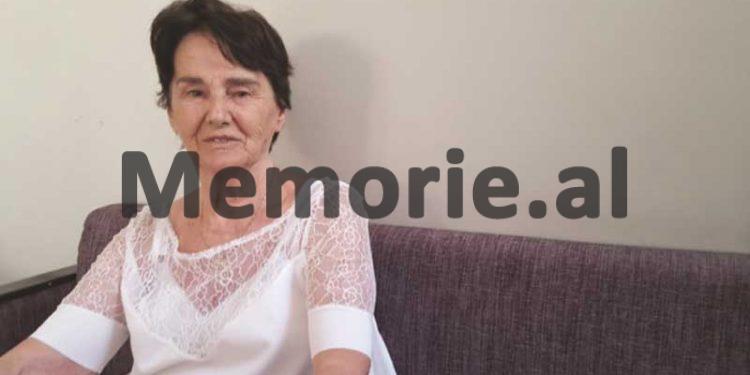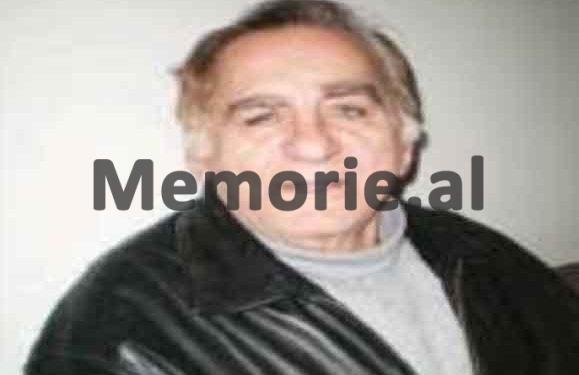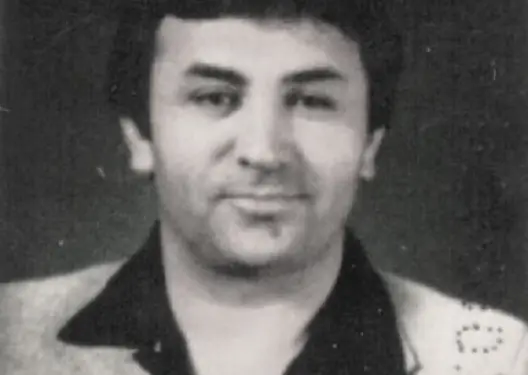second part
Memorie.al/ Rare testimony of 81-year-old Hysen Tabaku about the story of his escape in 1957 from the land border in the district of Peshkopi together with his brother Engjëllin and some other friends such as: Sait Coku, Shefqet Pira, Xhemil Meçe and Halit Meta, who remained on probation after he was arrested by border forces while some of his group comrades were killed by border bullets near the clone….
Continued from the previous issue
Before we leave for your escape from Albania, when and under what circumstances were you imprisoned and how many years in prison where you sentenced to?
I was imprisoned in 1957 after trying to escape from Albania. And the only reason for the 1957 attempt had to do with my young age, and I was hungry, so to speak, to see the world as they say it. At that time, the Tirana Conference took place, which seemed to soften the political situation of the communist regime in power, after there were strange clashes during 1956, I am talking about the international arena, but which were also reflected in Albania. This gave him a boost from the Hungarian revolution, because it raised hopes in Albania for a change in the system in power. In this time and political context, I wanted to escape abroad, but unfortunately, we were arrested at home. We, me and some other friends who had made plans to cross the border and go out into the free world, had been betrayed by a person of the group.
More specifically, what happened to you and your group?
As a start, for chronology I wanted to say that one of my sisters, Vera, had fled to Yugoslavia in 1956, after marrying a Kosovar and crossing the border, of course without permission. I wanted to add that this happened, because at that time there was an improvement in relations between official Tirana and Belgrade. And my sister’s departure for Yugoslavia gave me a boost to try her luck too. We, a group of friends with anti-communist ideals and beliefs, of which I was a part, formed a small group that we then began to enlarge. At that time, I was working in the Truck Automotive Park in Tirana and I was acquainted with some drivers who were working on Peshkopia Street, where the border was. In agreement with them, we decided to flee. They, therefore some of the drivers with whom we had talked about this work, for various reasons, had a mistrust of one of the members of our group and decided to stop this activity. So, they brought us back to zero point, taking nothing over. So, we split into two groups.
What were the names of the friends who belonged to these two groups?
In the first group were Sait Coku, Shefqet Pira and Halit Meta. In the other group were me, my brother, Engjëlli and Xhemil Meço. I was not expected, as a young boy I was, I wanted at all costs to move as quickly as possible to the free world. I met a person from Maqellara, (I am not telling you his name, as I do not want to hurt his family and relatives) who promised to take me abroad, but in fact he reported to the Security of the State. One night when we were preparing to leave, it was July 27, 1957, so we, all the friends I mentioned above, were arrested while we were sleeping. And after that, for 4 months I stayed in the investigator. I knew it would be impossible for me to resist the pressure of the investigation, mainly physical pressure, and when I was being arrested, I said to my younger brother, Ylli, “look, you are going to inform Shefqet e Saitin, that I they caught me. ” He understood what I was talking about.
And what happened to them?
A week later, they attempted to flee, but were spotted and clashed with border guards. In border efforts, Halit Meta was not with the group. The border forces in cooperation with the cooperative peasantry of the border belt, at that time surrounded the two and Seiti shot with a gun and wounded a road officer, as well as the chairman of the cooperative. Shefqet was killed at the border without leaving Yugoslavia.
How much were you convicted of that escape attempt?
My trial was held with an open-door military trial, which at the time was more propagandistic, to sow terror and fear, because we have caught them and we will punish them, because the staff of the Bus Park The truck was extremely large and wanted to scare others. The employees of this park were all invited to participate in this trial chaired by the president of the court, Bilbil Klosi. As a result, Seit was sentenced to be shot, Halit to 20 years in prison, Xhemil Meçe to 12 years in prison, me to 15 years in prison, and my brother, Engjëll, to 5 years in prison. After that, Seit Coku, the People’s Assembly spared his life as he had a martyred brother and had been a partisan himself.
How many years in prison did you personally suffer?
I, over time, served my sentence and won the amnesty. I received a reduced sentence from three amnesties made by the communist government of Tirana at the time. We prisoners working in labor camps also had an incentive. There I earned a two-year reduced sentence by working. I could not wait to get out of prison again, because I wanted freedom, I had changed my mind, I would escape from Albania, in the first case to be given to me. I was released from prison in August 1964. I was released from Vlora prison, from Caustic Soda, where we prisoners have built a factory. After getting out of prison, I started working as a welder, trades I had learned in prison. The then Minister of Interior had complained to the Politburo about the issue of prisoners, saying: “We put the prisoners in prison, but we gave them literature, they are trained in foreign languages there, they are trained and become workers they become skilled, they become iron-turners, plumbers, electricians and an even more powerful force emerges again ”. This as it were was a threat, we had to disappear completely, assimilate as a class.
In what facilities did you work as a welder?
I worked in the construction company “21 December” as a welder in assembly. We have installed elevators in the Palace of Culture in Tirana, stairs, shutters, ventilation, air conditioning system, etc. But as we Albanians say, it is better to stand out than fame, because I became famous as a good welder. This gave me a huge and weird advantage. I had developed quite a bit from prison because I had studied during that period. I focused mainly on French and English. At the same time, I was writing poetry and prose, which when I got out of prison, I burned them all because I did not want to go to prison for a second time and be accused of agitation and propaganda. These were such paranoid things about the system at that time, that very few understood that the Albanian state of that time relied on paranoia and terror to maintain power. That state had nothing human. But let’s get to my further work. After leaving “December 21” by decision of the Tirana Party Committee, I was assigned to the Tirana Water Company.
How was it possible for a former political prisoner to be allowed to work in water supply, when it was known that they were considered objects of special importance and were guarded so much that the enemy would not poison them? At least so it was said at the time…
Yes, it is more than true what you say, but at that time few people knew that I had been a political prisoner, while my name had come out and everyone said that “there is no better welder than this one”. This gave me the advantage of becoming famous not only in Tirana, but also in other companies. Over the years, I was sent to work at the Vermosh hydropower plant to weld the pipes of that facility, which was somewhat strange, as a political prisoner could not be sent to work at such an important hydropower plant. Even my director, who I had in the water supply, Foto Lula, even though he was a friend of mine, did not know that I had been imprisoned. He recalled that I had been at work as a driver and had been imprisoned for having had an accident. It was a strange thing, because I was in the border area and I could leave at any moment, but I did not do it and I never thought about it, because I had a very good friend of the general director of the Municipal Directorate, Pavllo Azduriani. And if I had escaped, he would have been the first to be held accountable and at least fired from the post of director. Since I was so famous, I made hydropower plants in Dukagjini of Theth, then I came down to Shënepremte, from there to the villages of Elbasan. In short, I did almost all the assembly and welding of the equipment of 7 hydropower plants in the mountainous areas of Albania. As a result, I made another one that is very magnificent, we made the water supply of Përmet.
You mentioned the former director of the Water Supply, Pavllo Azduriani, who had a friend and kept you at work, but did other people with high positions help you in those years?
Of course, there were many and most of them were also communists, or from such families, but quite honest though. Among them I will remember a name, engineer Vardar Starova, an extraordinary man, with a big heart, intellectual who spoke several foreign languages, to whom I owe as long as I live, as he has given me a help without which my life will had taken another direction, going worse and worse. Another person who helped me a lot at that time was Nehat Grazhdani, the head of the Technical Office of the Water Company, to whom I obviously owe a lot, as it was not very easy at that time for a staff tohelp a man like me, who had been in political prison.
Let’s go back to your work in facilities and industrial works and this fact is known, that political prisoners have participated and built the greatest works of Albania from south to north?
You cannot say exactly like that, because indeed political prisoners have made a great contribution with manual labor, while the other sides of the construction have been done by Albanian or foreign engineers with degrees. But I do not say that there were no exceptions, as there were political prisoners in camps and prisons who did professional work, which could not be done by workers or specialists who were free. I do not want to exaggerate what I say, but it is a known fact. We, unfortunately, say for most of my generation, had neither schools nor degrees. Our benefit was what we learned in prison, that prison became our school, to resist even more the regime and the oppression it exerted on our class.
But while you were well adjusted to work, you again decided to flee Albania?
As I told you a little above, the idea of escaping was an idea that had been ingrained in my conscience for a long time. I would do it because I lost a few years of my youth in prison and I was sorry to lose the rest of my life working in welding. I did not want to become a professor, but I did not want to work for others. I saw that I had the capacity to realize that dream, that is, to be free. But who aggravated this situation the most? Only threat from the state. Despite it being like a dream, the decision came spontaneously. I only talked to my nephew, Geri, my sister’s son and told him “I do not want to live in Albania anymore”. This also coincided with a case where homes were shared on a voluntary basis and I was never given one. Then I told my mother and told her “I will leave”. My mother has suffered a lot, because we have been in prison all our lives, because as I told you a little above, my father did 15 years and 7 months in prison, my younger brother, Ylli did 28 years and I did 7 years, my second brother , Angel has done 5 years in prison. My whole family has been in prison and exile, and if you add up these years of imprisonment and suffering, it amounts to 109 years of imprisonment. The mother herself suffered 9 months in prison. They tortured him and took all his gold and left us with no money at all, because we lived with them, because we were small children. We broke the gold to eat, but we lost it too. We grew up not wild, but more than poor, we had nothing. When I say nothing, except the four basement walls where we collided. We did not even have hours to orient ourselves to time. Regarding the work of the clock, I am telling you in two words one thing I say that speaks volumes. There was a cart we called the ‘Dum cart’, which passed from morning to morning to get to the train. It is about the time after the father was released from prison, around 1964. As soon as the father heard the trumpet of Dumi’s horse, he told us: “Dumi passed in a wheelchair, go to work because the time has come”. There was a day when Dumi got sick and did not go to work in a wheelchair and we were left awake and could not go to work because we did not catch the schedule. So, we were conditioned in some way by Dum’s wheelchair and if he didn’t get to work, we would stay too.
Following is Part III













